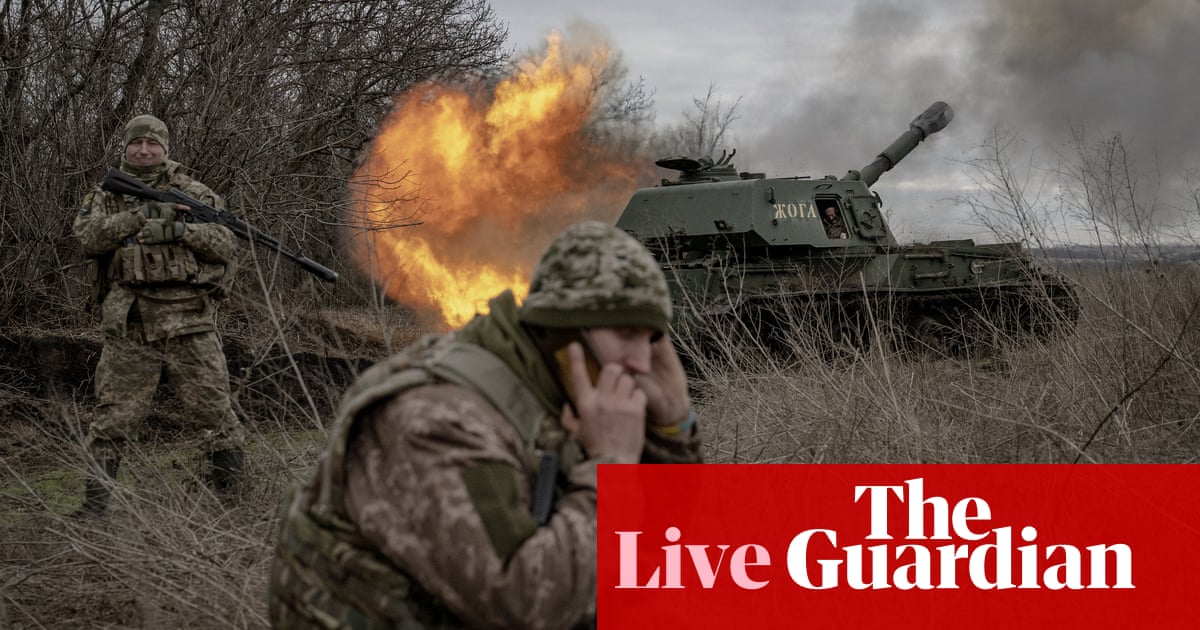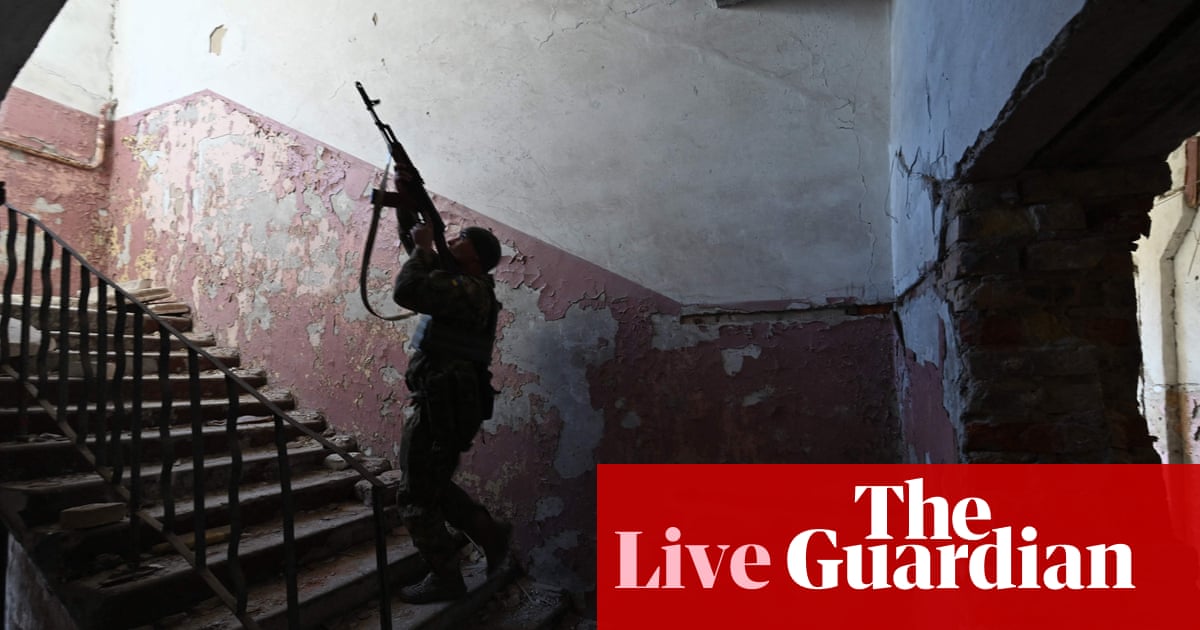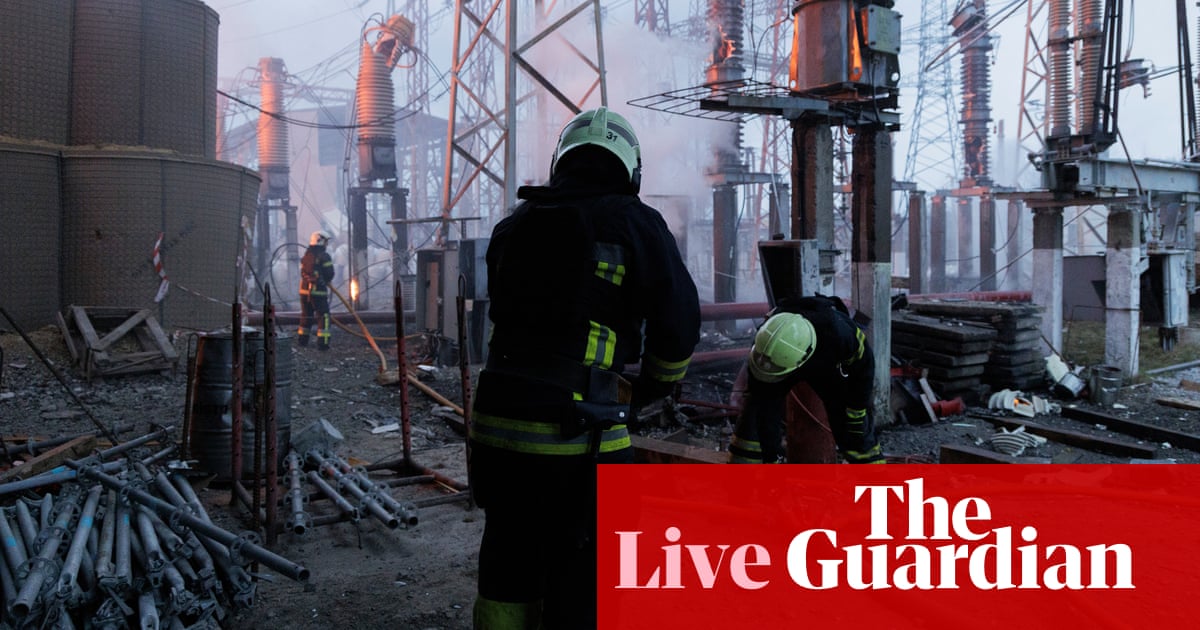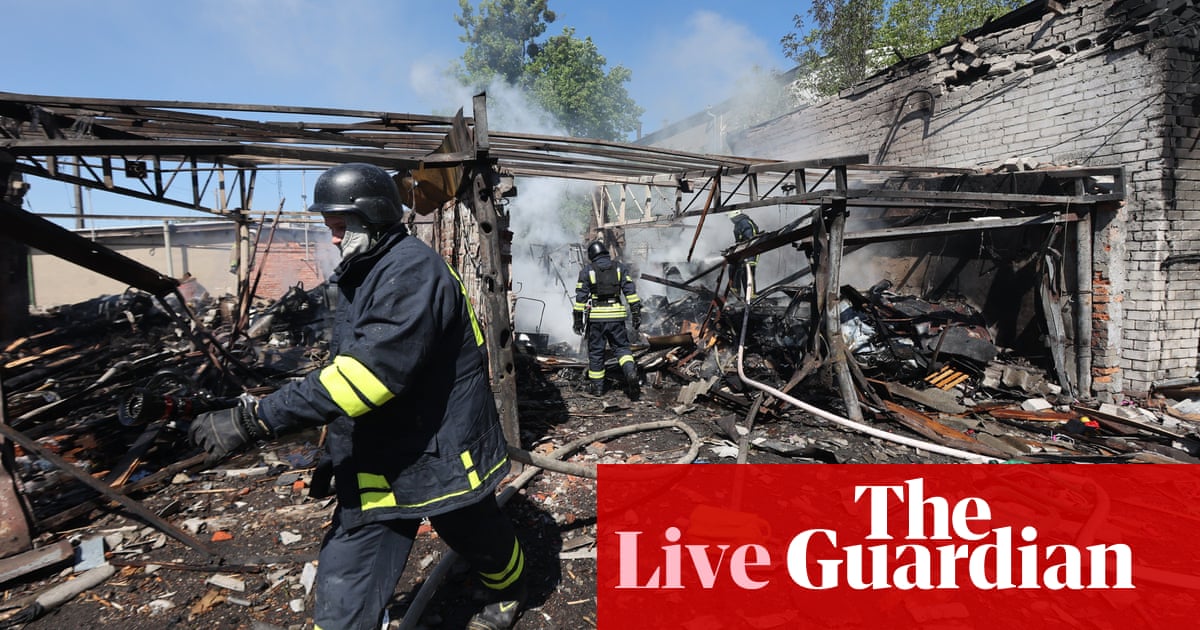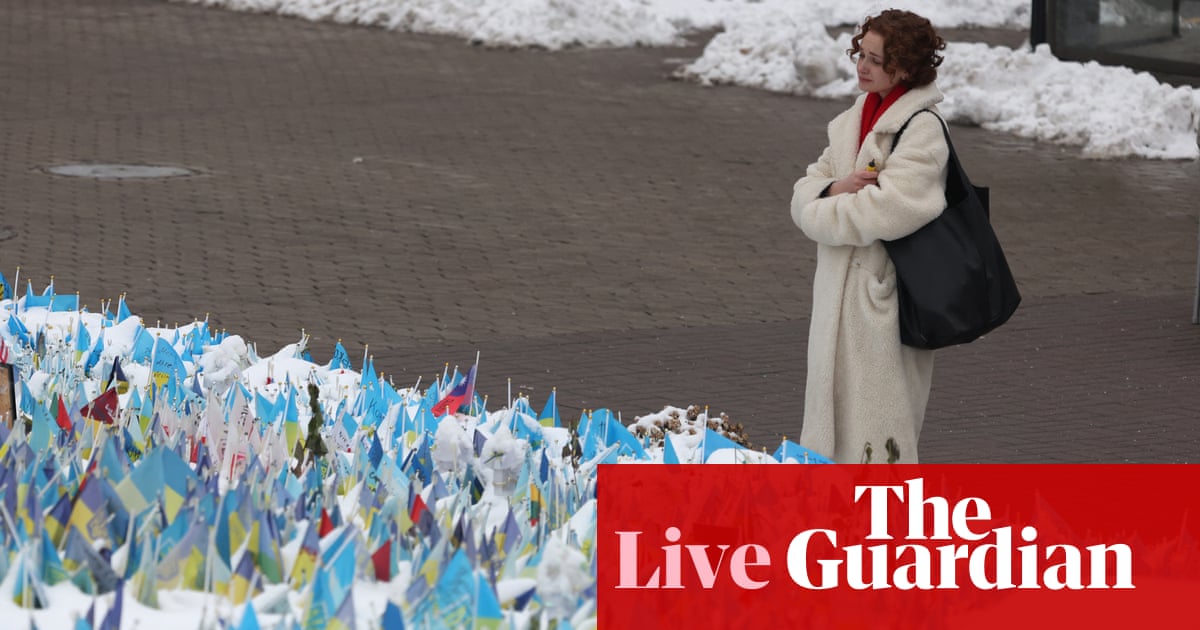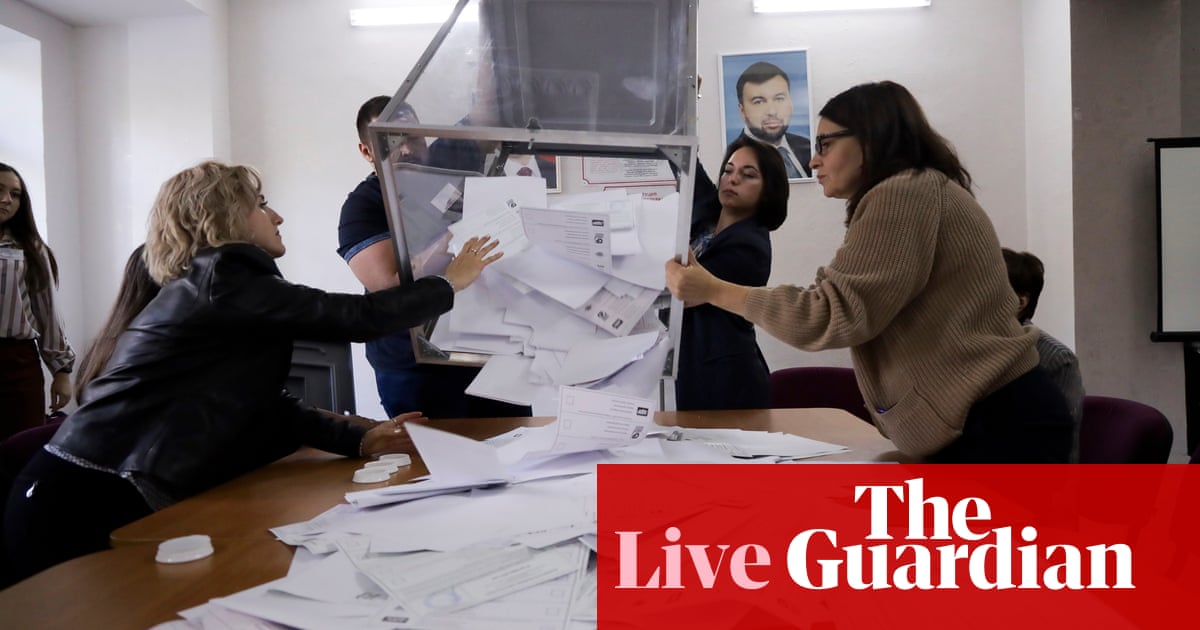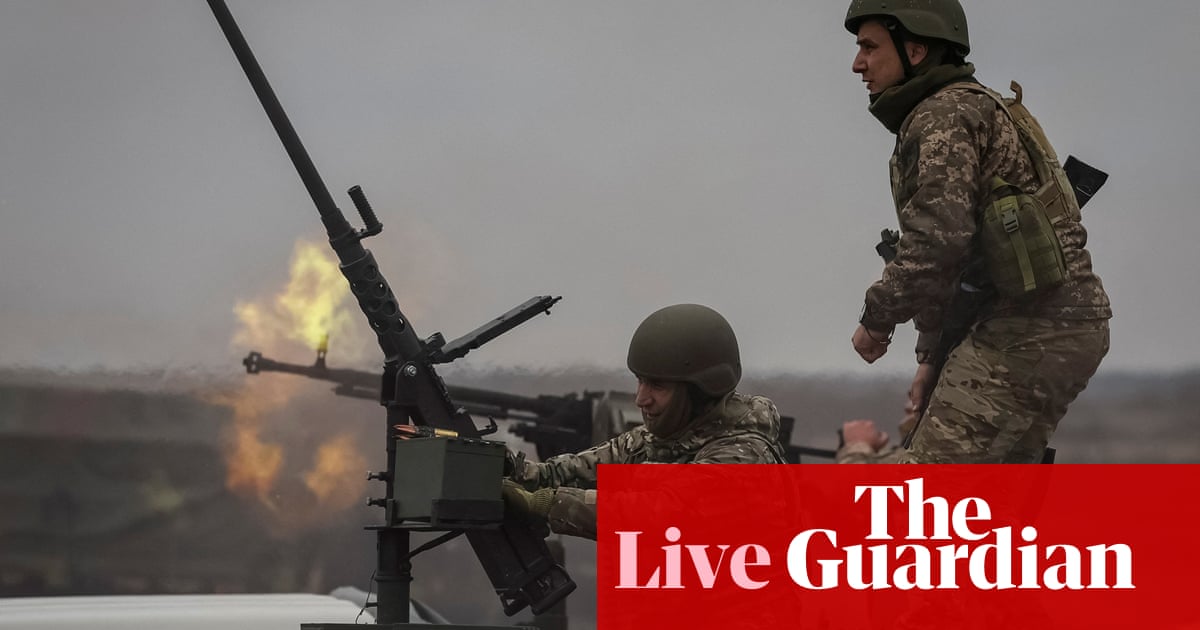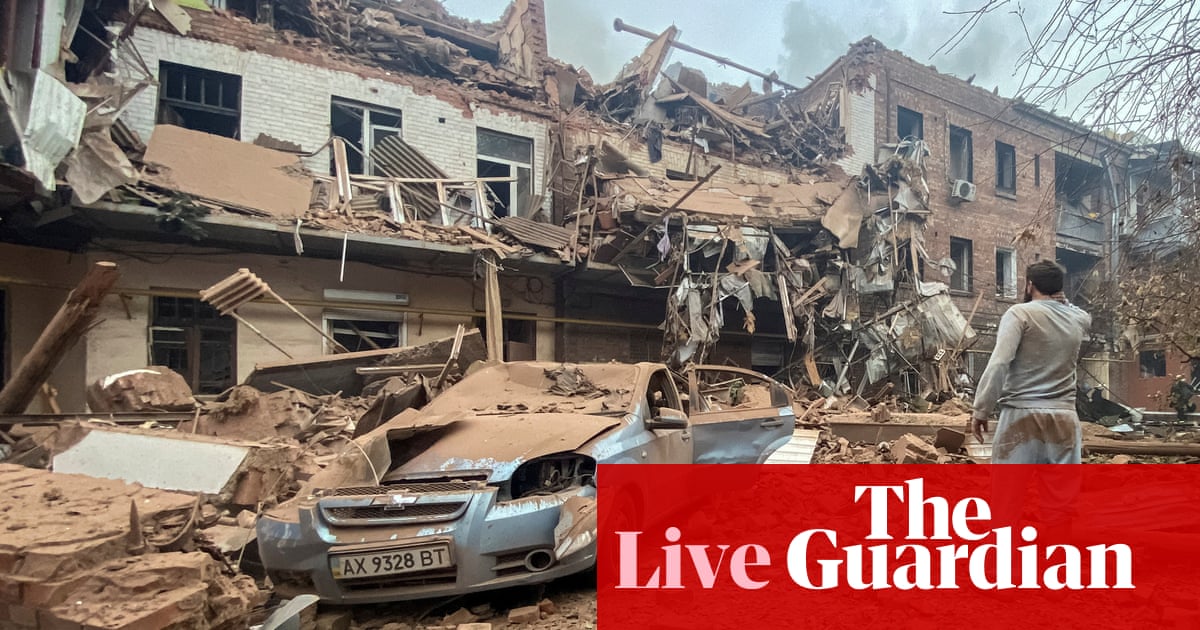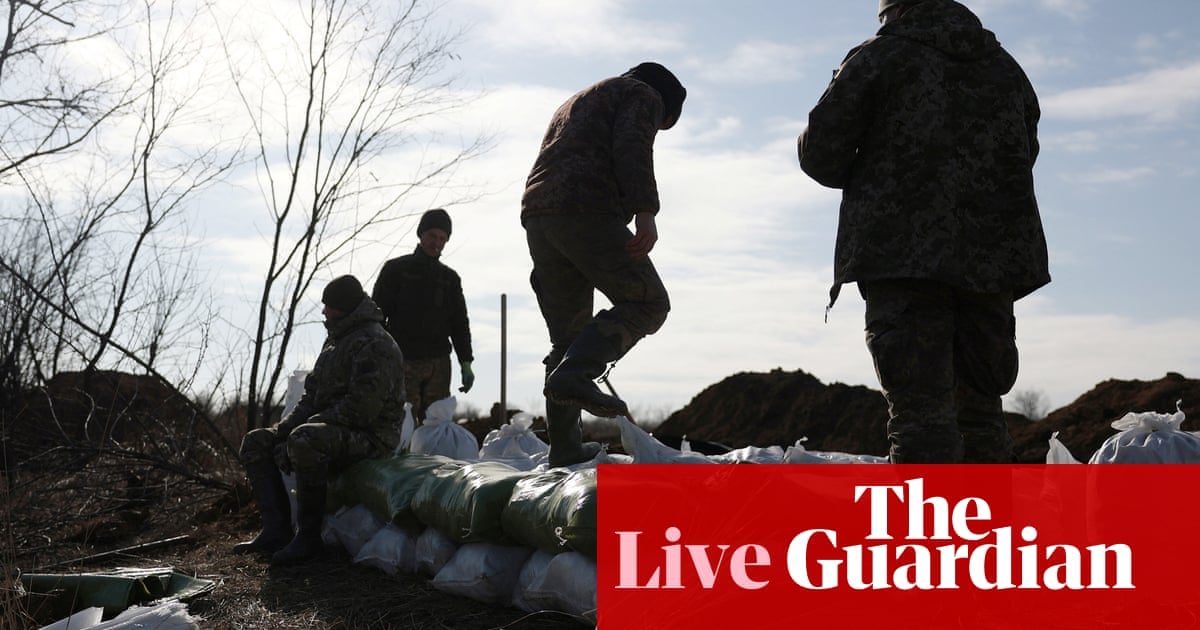
Russia says Avdiivka under its full control - Russian reports
Russian troops have established full control over the Ukrainian town of Avdiivka and have advanced 8.6 km (5.3 miles) in that part of the frontline, Russian news agencies reported on Sunday, citing the defence ministry.
According to Reuters, Russia claimed the capture of the Ukrainian town of Avdiivka after Ukraine withdrew, but Moscow said that some Ukrainian troops were still holed up in a vast Soviet-era coke plant after one of the most intense battles of the war.
Closing summary
It has just gone 6pm in Kyiv and 7pm in Moscow. We will be closing this blog soon, but you can stay up-to-date on the Guardian’s Russia and Ukraine coverage here.
Here is a recap of the latest developments:
Russian troops have reportedly established full control over the Ukrainian town of Avdiivka and have advanced 8.6 km (5.3 miles) in that part of the frontline, Russian news agencies reported on Sunday, citing the defence ministry. Russia claimed the capture Avdiivka after Ukraine withdrew, but Moscow said that some Ukrainian troops were still holed up in a vast Soviet-era coke plant. The fall of Avdiivka is Russia’s biggest gain since capturing the city of Bakhmut in May 2023.
Ukraine’s army on Sunday accused Russian forces of shooting two prisoners of war (PoW) and posted a grainy video shot from the air that they said showed the incident. AFP could not verify the authenticity of the video or the location and Ukrainian authorities have not commented on the news agency’s report.
More than 400 people were detained in Russia by Saturday night while paying tribute to opposition leader Alexei Navalny, according to the OVD-Info rights group that tracks political arrests and provides legal aid. Hundreds of people in dozens of Russian cities streamed to ad-hoc memorials and monuments to victims of political repressions with flowers and candles on Friday and Saturday to pay a tribute to the politician.
Ukrainian forces repelled a Russian offensive on the southern front after the withdrawal of Kyiv’s troops from the devastated eastern town of Avdiivka, the Ukrainian military said on Sunday. “Defence forces in the Zaporizhzhia sector defeated yesterday’s Russian offensive,” Ukrainian military said on Telegram, adding that 18 armoured vehicles including three tanks were destroyed and that the Russians “retreated to their previous positions”. So far there has been no comment from the Russian side.
“Please, do not ask Ukraine when the war will end. Ask yourself – why is Putin still able to continue it,” Ukrainian president Volodymyr Zelenskiy said as he addressed delegates at the 60th Munich Security Conference on Saturday. In a lengthy thread posted on his X account today, Zelenskiy shared a video of the speech and also wrote: “We can get our land back. And Putin can lose.”
China’s foreign minister Wang Yi has told his Ukrainian counterpart that Beijing does not sell lethal weapons to Russia for its war against Ukraine, a statement said on Sunday. China says it is a neutral party in the Ukraine conflict but has been criticised for refusing to condemn Moscow for its offensive.
Ukrainian foreign minister Dmytro Kuleba said on Saturday he had discussed the prospects for peace in Kyiv’s war against Russia with his Chinese counterpart. Kuleba said he had discussed Ukraine’s plans to hold a global peace summit, which Switzerland has agreed to help stage. The two men, he said, “agreed on the need to maintain Ukraine-China contacts at all levels and continue our dialogue”.
The UK’s shadow foreign secretary, David Lammy has said he would support further sanctions against Russia and added he would “plug the gaps” of existing measures. In seperate comments made at the Munich Security Conference on Sunday, Lammy said: “Russia will continue to be a threat for Europe for months, years, perhaps a generation more.”
Events on the battlefield in Ukraine are a matter of “life and death” for Russia that could determine its fate, president Vladimir Putin said in remarks aired on Sunday. The Kremlin has repeatedly framed the almost two-year conflict as a battle for Russia’s survival in a bid to rally patriotic sentiment among its population.
More than 100 Kremlin documents obtained by a European intelligence service and reviewed by The Washington Post, show that Russia ran a disinformation campaign to undermine the Ukrainian president Volodymyr Zelenskiy. The US publication said Kremlin instructions had “resulted in thousands of social media posts and hundreds of fabricated articles” that “tried to exploit what were then rumoured tensions” between Zelenskiy and his top army commander, Valerii Zaluzhnyi.
German politician Ricarda Lang pushed back at the idea of a deal with Russia, in response to US Republican senator JD Vance’s comments, that included his belief that Putin is not “an existential threat to Europe”, on a panel at the Munich Security Conference on Sunday. Lang said: “Putin has shown over and over again – and he just showed this with the murder of Navalny on Friday – that he has no interest in peace at the moment.”
Poland’s Radek Sikorski stressed Poland’s support for Ukraine at the third day of the Munich Security Conference, but acknowledged that Warsaw and Kyiv have two problems linked to grain and trucking. Responding to Sikorski on stage, Olha Stefanishyna, Ukraine’s deputy prime minister, said: “We have to solve it. There are legitimate messages on both sides. I think that the major contribution in resolving these issues has been done by Ukraine, because we secured the Black Sea.”
Brazil’s president Luiz Inácio Lula da Silva said on Sunday there should be a thorough investigation into the death of prominent Kremlin critic Alexei Navalny before making any accusations. Speaking at a press conference after attending an African Union summit in Addis Ababa in Ethiopia, Lula said refraining from taking a stance on the death at this moment was a matter of “common sense”.
Denmark has decided to donate all the artillery rounds from its stockpiles to Ukraine, Danish prime minister Mette Frederiksen told the Munich Security Conference on Saturday. Frederiksen did not specify how many artillery shells Denmark has in its stockpiles.
The EU’s foreign policy chief, Josep Borrell, said “the most important security commitment for Ukraine is membership” of the EU, in comments made at the Munich Security Conference on Sunday.
Russian opposition leader Alexei Navalny’s wife, Yulia Navalny, published a picture of the couple on her Instagram account on Sunday in what is her first social media post since her husband died. The caption read simply: “I love you.”
Estonian prime minister Kaja Kallas on Sunday dismissed a warrant issued by Russia for her arrest, saying it was just an attempt to intimidate her amid speculation she could get a top EU post. “It’s Russia’s playbook. It’s nothing surprising and we are not afraid,” she told Reuters in an interview on the sidelines of the Munich Security Conference. When asked by Reuters whether she was interested in any future European role she said: “We are not there yet.”
The wife of jailed British-Russian dissident Vladimir Kara-Murza has said she fears for her husband’s life after the death of Alexei Navalny. Evgenia Kara-Murza, has called on the international community to take further action to free political prisoners in Russia who she says are the only alternative to Putin’s regime.
Ukraine army accuses Russian forces of shooting two PoWs
Ukraine’s army on Sunday accused Russian forces of shooting two prisoners of war (PoW) and posted a grainy video shot from the air that they said showed the incident, reports AFP.
In the video, two soldiers labelled as Ukrainians run towards another labelled as Russian in a trench. The Russian soldier then grabs them and shoots numerous times until they stop moving, before turning back. The two men do not appear to have resisted capture. AFP could not verify the authenticity of the video or the location.
“This morning … the Russians once again showed their attitude to international humanitarian law by shooting two Ukrainian prisoners of war,” the ground forces wrote on Telegram. They said the incident happened in the area of responsibility of the Khortytsia group of troops, which operates on the eastern front, without giving a more precise location.
Ukrainian media reported it happened northeast of the village of Vesele in the Donetsk region, citing the Khortytsia group’s press service. Khortytsia’s troops were not involved in the withdrawal from the town of Avdiivka in the region, which Russia claimed Saturday to fully control.
Russia and Ukraine have several times accused each other of violating international humanitarian law by killing prisoners-of-war since Russia invaded.
The UN human rights office of the high commissioner has documented cases of summary executions of Ukrainian prisoners of war as well as torture.
Earlier on Sunday, the DeepState Telegram channel seen as close to the Ukrainian army reported that Russian forces had shot six injured Ukrainian soldiers left behind during the withdrawal from Avdiivka, most likely on Thursday.
It said the men had been too badly wounded to leave the Zenit position near the town of Avdiivka with other troops during Ukraine’s withdrawal and comrades had recognised their bodies on a video posted on social media by Russians.
Ukrainian authorities have not commented on AFP’s report.
Danish prime minister says Denmark to donate all its artillery to Ukraine – report
Denmark has decided to donate all the artillery rounds from its stockpiles to Ukraine, Danish prime minister Mette Frederiksen told the Munich Security Conference on Saturday, reports The Kyiv Independent.
“If you ask Ukrainians, they are asking us for ammunition now, artillery now. From the Danish side, we decided to donate our entire artillery,” Frederiksen said.
“There is still ammunition in European stocks. This is not a question of only production because we have the weapons, we have ammunition, we have air defence that we don’t have to use ourselves at the moment that we should deliver to Ukraine.”
The Kyiv Independent report that Frederiksen did not specify how many artillery shells Denmark has in its stockpiles.
“Russia does not want peace with us. They are destabilizing the western world from many different angles – in the Arctic region, the Balkans, and Africa – with disinformation, cyber-attacks, hybrid war, and obviously in Ukraine,” she said.
Russia will not intimidate me, Estonia"s Kallas says
Estonian prime minister Kaja Kallas on Sunday dismissed a warrant issued by Russia for her arrest, saying it was just an attempt to intimidate her amid speculation she could get a top EU post, reports Reuters.
Once ruled by Moscow but now a member of both the EU and Nato, Estonia has been a supporter of Kyiv and Kallas has been one of Moscow’s most vocal critics since the Russian invasion of Ukraine nearly two years ago.
Russian police placed her and several other Baltic politicians on a wanted list on 13 February for destroying Soviet-era monuments.
“It is meant to intimidate and make me refrain from the decisions that I would otherwise make,” Kallas told Reuters in an interview on the sidelines of the Munich Security Conference. “But it’s Russia’s playbook. It’s nothing surprising and we are not afraid.”
The Baltic politicians risk being arrested only if they cross the Russian border, otherwise declaring them wanted has no real consequences.
Kallas’s high profile in pushing the EU to do more to support Ukraine has led to speculation in Brussels that she could take on a senior role after the next EU parliamentary elections in June, possibly as foreign policy chief. She said that speculation was also contributing to Russia’s aggression towards her.
“It’s hard to be popular,” she said ironically. “The Russians have also seen that, and that’s why they issued the arrest warrant to really emphasise the biggest argument against me, that I am a provocation to Russia.”
When asked by Reuters whether she was interested in any future European role she said: “We are not there yet. I’m the prime minister of Estonia.”
More now on the aftermath of the death of Russian opposition leader Alexei Navalny.
His wife, Yulia Navalnaya, published a picture of the couple on her Instagram account on Sunday in what is her first social media post since her husband died.
The caption read simply: “I love you.”
It comes as hundreds of people in dozens of cities visited ad-hoc memorials and monuments to victims of political repressions with flowers and candles on Friday and Saturday to pay a tribute to the politician.
As we reported earlier, police detained 401 people by Saturday night, according to the OVD-Info rights group that tracks political arrests and provides legal aid.
More than 200 arrests were made in St Petersburg, the group said. The city’s courts have ordered 42 of those detained on Friday to serve from one to six days in jail, while nine others were fined, officials said. In Moscow, at least six people were ordered to serve 15 days in jail, according to OVD-Info. One person was also jailed in the southern city of Krasnodar and two more in the city of Bryansk, the group said.
The news of Navalny’s death came a month before a presidential election in Russia that is widely expected to give Vladimir Putin another six years in power.
It has been almost two years since the invasion of Ukraine and our colleague Shaun Walker has been taking a look at what may happen in the coming months.
The grim news, as the second anniversary of Russia’s full-scale invasion approaches, is another sign that the third year of the war could be the hardest yet for Ukraine.
The mood is very different from that of a year ago, when amid the horror Ukrainians remained buoyed up by the extraordinary consolidation of national society, and looked forward to the swift liberation of all territories occupied by Russia.
The wife of jailed British-Russian dissident Vladimir Kara-Murza has said she fears for her husband’s life after the death of Alexei Navalny, reports the Press Association (PA).
Kara-Murza has been a long-term critic of Russian president Vladimir Putin and has survived two poisonings since 2015, which have left him with a form of nerve damage called polyneuropathy. He was jailed by a Moscow court in April 2023, leading the UK to sanction 11 individuals involved in his case.
According to PA, his wife, Evgenia Kara-Murza, has called on the international community to take further action to free political prisoners in Russia who she says are the only alternative to Putin’s regime.
She told the BBC’s Sunday With Laura Kuenssberg that she had feared for her husband’s life since he was first poisoned in 2015 and now sleeps with her phone by her bed “dreading” a call with similar news.
She said:
I believe that my husband’s life is in danger, as are lives of many other political prisoners in Russian prisons, because these people are kept behind bars, very often with serious medical conditions with no proper medical treatment, and they are kept in such conditions in order to make their state of health deteriorate.
With all that is happening, I cannot afford breaking down, I cannot afford being afraid, I cannot afford just the normal human feeling of fear. I have to always fight that and step over it and say yes, I am afraid, but that is not important right now.
Continuing the fight is important, telling the stories of those people who are suffering from the regime is important. Today, people are getting arrested for laying flowers to the memorials of the victims of repression, that situation is deteriorating, it seems, by the day.”
Speaking of Navalny’s death, she said:
I was horrified but not surprised because the use of political assassination as a method of dealing with opponents has been there for the entire rule of Vladimir Putin. He has been using this method since early-2000s.
This was a murder for which Vladimir Putin is responsible. All that impunity that lasted for decades, led him to believe that he is somehow untouchable, and for as long as he is sitting in the Kremlin unchecked, we will see more warmongering, we will see more repression and we will see more deaths.”
Calling on governments to step up action against Russia, she urged them to “get on the same page with help to Ukraine. The US Congress has been debating that aid to Ukraine for how long now? And they seem to be finally, finally agreeing that it is needed, but come on, did Alexei Navalny have to die for this to happen?”
She added:
I have this question to the international community. Will it maybe, finally, say that Vladimir Putin isn’t a legitimate leader when it comes to political prisoners?
Yes, more should be done to get those whose lives are in danger out. These people who are being now slowly killed, these are – they represent that alternative to Vladimir Putin, and if they’re not saved, who is going to be there to rebuild the country from scratch? Who is going to make Russia into a democracy if not these people that have stood up, with their heads held high and said no?”
China tells Ukraine it "does not sell lethal weapons’ to Russia
China’s foreign minister has told his Ukrainian counterpart that Beijing does not sell lethal weapons to Russia for its war against Ukraine, a statement said on Sunday.
According to AFP, Wang Yi told Dmytro Kuleba during a meeting on the sidelines of the Munich Security Conference on Saturday that China “does not take any advantage of the situation, and does not sell lethal weapons to conflict areas or parties to the conflict”, according to a foreign ministry readout.
China says it is a neutral party in the Ukraine conflict but has been criticised for refusing to condemn Moscow for its offensive.
China and Russia have ramped up economic cooperation and diplomatic contacts in recent years, and their strategic partnership has only grown closer since Moscow’s invasion of Ukraine.
Beijing has faced accusations that it is supplying lethal arms to Russia, charges it has always denied.
“No matter how the international situation changes, China hopes that China-Ukraine relations will develop normally and continue to benefit the two peoples,” Wang told Kuleba, according to the ministry’s readout.
“Once again, I would like to thank Ukraine for helping the Chinese people evacuate safely under emergency conditions,” it said. “The Chinese people will never forget that.”
The readout said Wang stressed that China adheres to the political settlement of flashpoint issues and insisted on promoting peace talks.
“We will continue to play a constructive role in bringing an early end to the war and re-establishing peace,” Wang told Kuleba.
“Even if there is only a glimmer of hope for peace, China will not give up its efforts.”
Brazil"s Lula says there should be a thorough investigation into Navalny"s death before any accusations
Brazil’s president Luiz Inácio Lula da Silva said on Sunday there should be a thorough investigation into the death of prominent Kremlin critic Alexei Navalny before making any accusations, reports Reuters.
His remarks were in sharp contrast to western leaders’ strong and swift criticisms of Russia over Navalny’s death while being held in a jail about 40 miles north of the Arctic Circle on Friday. US president Joe Biden said Russian president Vladimir Putin and “his thugs” were responsible.
Kremlin spokesperson Dmitry Peskov rejected such accusations as unacceptable.
Speaking at a press conference after attending an African Union summit in Addis Ababa in Ethiopia, Lula said refraining from taking a stance on the death at this moment was a matter of “common sense”.
“A citizen died in prison, I don’t know if he was ill or had any issues,” Lula said. “To make an accusation is to trivialise. I hope that a coroner will provide an explanation for why the individual died, that’s all.”
Lula’s comments reflected how non-western nations have not joined the west in its efforts to deeply isolate Russian Putin over the invasion of Ukraine and other issues.
Lula has repeatedly called for peace in Ukraine and says that Russia should not have invaded, but he says that the US has needlessly prolonged the war.
Navalny’s mother was told on Saturday her son had been struck down by “sudden death syndrome” and that his body would not be handed over to the family until an investigation was completed, his team said.
During the press conference, Lula advocated for the global south to assert its due place in the economy, politics, and culture, highlighting the importance of the Brics bloc for this purpose. The group, consisting of Brazil, Russia, China, India and South Africa, officially expanded in January with the inclusion of Egypt, Ethiopia, Iran, Saudi Arabia, and the United Arab Emirates.
Kremlin ran disinformation campaign to undermine Zelenskiy, reports The Washington Post
More than 100 Kremlin documents obtained by a European intelligence service and reviewed by The Washington Post, show that Russia ran a disinformation campaign to undermine the Ukrainian president Volodymyr Zelenskiy.
According to The Washington Post, files were shared with them to “expose for the first time the scale of Kremlin propaganda targeting Zelenskiy with the aim of dividing and destabilising Ukrainian society – efforts that Moscow dubbed ‘information psychological operations’”.
The Washington Post said Kremlin instructions had “resulted in thousands of social media posts and hundreds of fabricated articles, created by troll farms and circulated in Ukraine and across Europe” that “tried to exploit what were then rumoured tensions” between Zelenskiy and his top army commander, Valerii Zaluzhnyi. Earlier this month, Zelenskiy fired Zaluzhnyi, in Ukraine’s biggest military shake-up since Russia’s full-scale invasion began nearly two years ago.
The US publication said that at a meeting on 16 January 2023, the Kremlin’s first deputy chief of staff, Sergei Kiriyenko “laid out four key objectives for the Ukraine propaganda team: discrediting Kyiv’s military and political leadership, splitting the Ukrainian elite, demoralizing Ukrainian troops and disorienting the Ukrainian population, the documents show”.
Kremlin spokesperson Dmitry Peskov, head of the Kremlin’s department for developing information and communication technologies Tatyana Matveeva, and Alexander Kharichev did not respond to The Washington Post’s requests for comment on the contents of the documents.
"Most important security commitment" for Ukraine is membership of the EU, says Josep Borrell
Speaking at the Munich Security Conference on Sunday, the EU’s foreign policy chief, Josep Borrell, said the most important geopolitical issues facing the EU today are related to Ukraine, Gaza and the global south – as well as defence.
“We have to increase and provide Ukraine with security commitments,” he said, adding that “the most important security commitment for Ukraine is membership” of the EU.
He also warned that “we have to consider different scenarios about how much engaged will US be on European security.”
"We can get our land back and Putin can lose", says Zelenskiy
“Please, do not ask Ukraine when the war will end. Ask yourself – why is Putin still able to continue it,” Ukrainian president Volodymyr Zelenskiy said as he addressed delegates at the 60th Munich Security Conference on Saturday.
In a lengthy thread posted on his X account today, Zelenskiy shared a video of the speech and also wrote:
24 February 2022, could have marked the end of the world as we all know it. A world of rules meant to protect life. Our resistance, with the support of partners, has put on hold the destruction of this rules-based world order. 2024 must become a time for its full restoration.
It is not the rules that define the world’s life that should remain in the past, but rather, a Russia that doesn’t respect the rules should remain in the past. And we can ensure this. Not just by doing something. But by doing everything necessary.
He also said: “Ukrainians have proven that we can force Russia to retreat and that we are capable of restoring the rules. And with this, we leave absolutely nothing of the key Russian myth-the myth that Ukraine supposedly cannot win this war.”
Zelenskiy said that if Ukraine did not defeat Russian president Vladimir Putin now, then it would not matter who leads Russia:
If we don’t defeat Putin now, it won’t eventually matter who leads Russia. Every new Russian dictator will remember how to maintain power by annexing lands, killing opponents, and destroying the world order. If this happens, Europe, Central Asia and the world will be dark places.”
“We can get our land back. And Putin can lose,” wrote Zelenskiy, saying that “this has already happened more than once on the battlefield”. He added: “Our actions are limited only by the sufficiency and length of the range of our strength-by what does not depend on us. And the Avdiivka situation proves this exactly.”
Russia says Avdiivka under its full control - Russian reports
Russian troops have established full control over the Ukrainian town of Avdiivka and have advanced 8.6 km (5.3 miles) in that part of the frontline, Russian news agencies reported on Sunday, citing the defence ministry.
According to Reuters, Russia claimed the capture of the Ukrainian town of Avdiivka after Ukraine withdrew, but Moscow said that some Ukrainian troops were still holed up in a vast Soviet-era coke plant after one of the most intense battles of the war.
Here are some of the latest images from the newswires:
Russia says Ukrainian units entrenched at Avdiivka coke plant
Russia claimed the capture of the Ukrainian town of Avdiivka after Ukraine withdrew, but Moscow said that some Ukrainian troops were still holed up in a vast Soviet-era coke plant after one of the most intense battles of the war, reports Reuters.
The fall of Avdiivka is Russia’s biggest gain since capturing the city of Bakhmut in May 2023, and comes almost two years to the day since Russian president Vladimir Putin triggered a full-scale war by ordering the invasion of Ukraine.
According to Reuters, Ukraine said it had withdrawn its soldiers to save troops from being fully surrounded after months of fierce fighting. Putin hailed the fall of Avdiivka as an important victory and congratulated Russian troops.
“The head of state congratulated Russian soldiers on this success, an important victory,” the Kremlin said in a statement on its website.
But Russia said some Ukrainian forces were still holed up at the Soviet-era coke plant, once one of Europe’s biggest, in Avdiivka, which is key to Russia’s aim of securing full control of the industrial Donbas region.
“Measures are being taken to completely clear the town of militants and to block Ukrainian units that have left the town and are entrenched at the Avdiivka Coke and Chemical Plant,” Russian defence ministry spokesperson Igor Konashenkov said.
There was no public comment yet by Ukrainian authorities on this. Russian state television showed blue and yellow Ukrainian flags being taken down in Avdiivka and Russia’s white, blue and red flag raised, including over the coke plant.
The Russian defence ministry said Russia had taken about 32 square kilometres (12 square miles) of territory in the advance amid heavy losses for Ukraine. It gave no figures for Russian losses, which Ukraine says are huge.
Russia cast the Ukrainian withdrawal as rushed and chaotic, with some soldiers and weapons left behind. The Ukrainian military said there had been casualties but that the situation had stabilised somewhat after the retreat.
Ukraine military says it repelled Russian offensive on southern front
Ukrainian forces repelled a Russian offensive on the southern front after the withdrawal of Kyiv’s troops from the devastated eastern town of Avdiivka, the Ukrainian military said on Sunday.
According to Reuters, Ukraine’s army top general Oleksandr Syrskyi said on Saturday that Kyiv’s troops withdrew from Avdiivka to avoid encirclement after months of fierce Russian attacks, Moscow’s biggest advance since its troops captured the city of Bakhmut last May.
“Defence forces in the Zaporizhzhia sector defeated yesterday’s Russian offensive,” Ukrainian military said on Telegram messaging app. The military said 18 armoured vehicles including three tanks were destroyed and that the Russians “retreated to their previous positions”.
So far there has been no comment from the Russian side.
The southern Zaporizhzhia direction became the main focus of the Ukrainian counteroffensive in the summer of 2023 although there were no significant breakthroughs and only a few settlements were liberated.
UK shadow foreign secretary David Lammy says he would support further sanctions against Russia
The UK’s shadow foreign secretary, David Lammy has said he would support further sanctions against Russia and added he would “plug the gaps” of existing measures.
He told BBC’s Sunday With Laura Kuenssberg:
The UK has led on sanctions, the issue now is the enforcement of those sanctions and if we do have the privilege to serve, that is the area in which I will look more closely to ensure that there is the proper coordination across both the Foreign Office and the Treasury.
I remain concerned about the dirty money that continues to flow through London, I remain concerned that the full implementation of the Russia report following the interference in our elections and the work of our select committee have not been fully implemented.
So yes, I think there are gaps and if we are successful, when the general election is held, I intend to plug those gaps.”
Poland’s Radek Sikorski has stressed Poland’s support for Ukraine at the third day of the Munich Security Conference, but acknowledged that Warsaw and Kyiv have two problems linked to grain and trucking.
This is difficult because it’s structural.
Responding to the Polish foreign minister on stage, Olha Stefanishyna, Ukraine’s deputy prime minister, said:
We have to solve it. There are legitimate messages on both sides.
I think that the major contribution in resolving these issues has been done by Ukraine, because we secured the Black Sea. And now the grain is easily releasable through the Black Sea. We also have done our steps that we ensured the control of exports to neighbouring countries.
So there are some steps done, but we have to solve it.
Putin says Ukraine "matter of life and death" for Russia
Events on the battlefield in Ukraine are a matter of “life and death” for Russia that could determine its fate, president Vladimir Putin said in remarks aired Sunday, reports news agency Agence France-Presse (AFP).
The Kremlin has repeatedly framed the almost two-year conflict as a battle for Russia’s survival in a bid to rally patriotic sentiment among its population, many apathetic toward the offensive.
“I think it is still important for us ourselves, and even more so for our listeners and viewers abroad, to understand our way of thinking,” Putin said in an interview with state TV.
“Everything that is happening on the Ukraine front: For them it is an improvement of their tactical position, but for us it is our fate, it is a matter of life and death,” he said.
Putin was responding to a question about a two-hour long interview he gave to US talkshow host Tucker Carlson, which the Kremlin used to promote its narratives on the conflict.
In that interview, Putin talked at length about Russian history and continuously questioned Ukraine’s statehood, drawing ire in both Kyiv and the west.
“For the western listener, the viewer, it was not easy. Even more so for Americans,” Putin said when asked about his long, historical musings in the Carlson interview.
“The history of the US is 300-odd years, and I started in 862. So I think it was not easy for American audiences to understand,” he said.
Responding to US Republican senator JD Vance on a panel at the Munich Security Conference on Sunday, German politician Ricarda Lang pushed back at the idea of a deal with Russia.
Putin has shown over and over again – and he just showed this with the murder of Navalny on Friday – that he has no interest in peace at the moment. That he does not want





